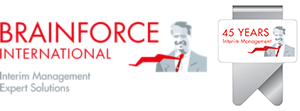Interim Solutions
Many factors contribute to the success of a company, but a constant is the importance of leadership. Only leadership brings all relevant factors together to deliver a performance that adds value. A performance for which – in the corporate world – customers are willing to pay, as they get a benefit from it. We can thus define leadership (here used equivalently to management) as transformation of resources into value. This applies to any type of company and related resources.
Management is the shaping and steering task of the executives of an organization. This applies to all managers, regardless of rank. It is a fact, that the overall influence of top executives on the success of a company might be higher, but the performance of a specialist is often just as crucial. This also applies to our hand-picked interim managers.
Now, it is certain that managers are as different as people can be. However, from experience and observation, a specific set of criteria can be identified characterizing the effective ones. In this first part, we want to address the expert competency, but in particular the mindset of such managers.
If the expert knowledge is specific to industries and area of responsibility, the basic attitude of effective leaders is the same in any kind of organization and management role. It goes without saying, every outstanding leader possesses and nurtures specific traits, but the principles proposed here are a common base.
From my own twenty-years of management experience, as well as from the exchange with and observation of thousands of executives in my management consulting and training activities, and last but not least, considering the insights of the management Doyen Peter Drucker and Professor Fredmund Malik – for whom I had the chance to work for many years – we recognize four crucial principles distinguishing effective executives in their practices:
- 1) Result orientation in the light of the whole
- 2) Utilizing strengths of the employees and the organization
- 3) Openness towards others and other’s opinions
- 4) Thinking in possibilities and positive attitude
Before going into the principles, let us reflect on the importance of the expert competency. We can distinguish between two areas of expert competence – the one related to the area of responsibility and the industry knowledge. In many business areas, competency with regard to the task is very important, but the higher in the hierarchy, the more its significance decreases. In some cases, a high degree of expertise is even counterproductive for senior executives, if they do not actively counteract, by letting their own managers act and looking out for the big picture.
Regarding sector affinity, it is an important prerequisite for success, as a manager must be able to understand the rules of a specific business and assess the activities in his own area of responsibility. This is especially true for the industry where the management experience has been accumulated. Certainly, the business of a financial services provider is ticking differently from that of a pharmaceutical company, but also here one must stay alert. Disruptive business models are not only a consequence of internet, but have always been there. They mostly emerged from other industries. Good – meaning effective – leaders, who care for the long-term success of a company, are aware of this. This is part of the basic attitude, described by the abovementioned principles of management, and which I like to elaborate on.
1) Result orientation in the light of the whole
Effective managers are result oriented and this, in the light of the whole. They always ask themselves: What is the expected result from an activity? Regardless of the reason why one has to deal with a certain task, you should always reflect on this question. Some among us are more accustomed to think and act in this logic. Others have rather to make a bigger effort. Everyone who wants to be effective must do it.
This helps to allocate your own time properly and thus increase your efficiency in doing. More importantly, however, is the resulting increase in effectiveness. Before even starting an activity, the expected outcome is clarified, increasing significantly the chance of achieving it. In an organization, results are often intermediate results on the way to the final goal – delivering customer value. Effective executives thus consider their own actions and the objectives in view of the whole. This leads to a self-regulating corrective and development of the desired goals.
2) Utilizing strengths of the employees and the organization
The second characteristic of effective leaders, one can observe, is the utilization of strengths. It is easy and wide spread practice to identify weaknesses and even try to eradicate them. However, outstanding performance is always achieved through the utilization of strengths. We have to recognize our own strengths, as well as those of our employees, colleagues and bosses. With respect to the company, we have to recognize the strengths of the organization (its units), products and services, as well as the brand, to mention only a few key aspects.
Excellent managers differ from mediocre ones by setting their focus on unfolding and consequently developing strengths. Weaknesses, on the other hand, are only reduced to the extent that they do not hinder the full deployment of strengths.
3) Openness toward others and other’s opinions
We all agree today’s world has reached an enormous complexity, continuously growing further. This is a fact for all companies and it could be mathematically proven. But much more important for us leaders are the implications for our management practice. Without entering the depths of cybernetics, we can note that complexity can only be mastered (if at all) by complexity (see Ashby’s “law of requisite variety”). I will write on this topic in a subsequent article.
What we can state here is the following: in an organization or a company, one person alone is unable to grasp the entire complexity of the business, let alone master it. Good managers are aware of this and maintain an open attitude. This third principle stands for openness toward others and other’s opinions. They listen and foster actively the exchange with employees, colleagues and business partners – especially customers.
New and different ideas are not rejected from the outset, but are recorded and used as an opportunity for reflection. This is a prerequisite for having a chance to understand the complexity of the own company, but especially to deal with it the right way. It is to encourage self-responsibility and self-management and to enable employees to take the right decisions and actions in the interest of the company, right where things are happening. This increases the performance of the organization and creates trust. The employees are not mere workforce, but valuable discussion partners and knowledge providers. Executives who act according to this maxim, are able to integrate their team and unfold its full power.
4) Thinking in possibilities and positive attitude
The fourth and most personal characterization of effective managers is the positive attitude. This is shown in a “can do” attitude. Problems are seen, but at the same time solutions are recognized and developed. Executives who think in solutions do not externalize the causes of a problem. The causes only interest, to the extent they contribute to the solution. What these managers rather ask themselves is: “what can I do in this situation, with the resources I can influence?”.
The positive attitude is often reflected in their confidence that something is achievable, as well as in communication and presence of a manager. This frees up energies – for oneself as well as for one’s environment – needed to successfully implement the targeted intention. A constructive and positive attitude is something one can get accustomed to and it is worthwhile to work on it. It is not only an essential foundation for success, but also makes daily life much more enjoyable for oneself as well as for one’s environment.
Zurich, 9 February 2017

Member of the Executive Management
Executive Vice President Expert Solutions


